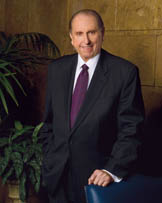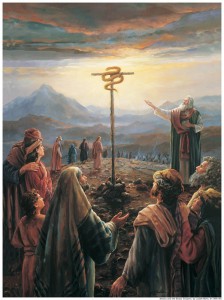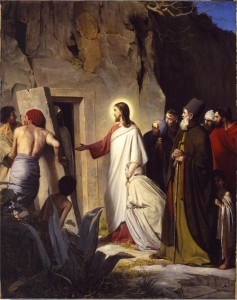Elder Carl B. Cook, a member of the Quorum of Seventy of The Church of Jesus Christ of Latter-day Saints (sometimes inadvertently referred to as the “Mormon Church” in the media), recently recounted a story about Church President Thomas S. Monson. Elder Cook (high-level administrators in the Church are given the title of “Elder”) was leaving his office one day, weighed down by his heavy responsibilities and heavy briefcase. While gazing at the elevator floor on the way down, he heard a voice he recognized: that of Thomas S. Monson:
“What are you looking at down there?” I recognized that voice—it was President Thomas S. Monson.
I quickly looked up and responded, “Oh, nothing.” (I’m sure that clever response inspired confidence in my abilities!)
But he had seen my subdued countenance and my heavy briefcase. He smiled and lovingly suggested, while pointing heavenward, “It is better to look up!” As we traveled down one more level, he cheerfully explained that he was on his way to the temple. When he bid me farewell, his parting glance spoke again to my heart, “Now, remember, it is better to look up” (Elder Carl B. Cook, October 2011 General Conference of The Church of Jesus Christ of Latter-day Saints).
 Thomas S. Monson: Prophet, Seer, and Revelator
Thomas S. Monson: Prophet, Seer, and Revelator
Thomas S. Monson is more than just the President of the Church. He is a living prophet, seer, and revelator. As the Lord’s spokesman on the earth today, he holds the priesthood responsibility to communicate God’s will to individuals, to the Church, and to the world. He is not just the prophet for Mormons; he is the prophet for all humankind. His brief communication to Elder Cook helped Elder Cook look to God, and find in his Heavenly Father and Jesus Christ the comfort that he needed. This is the role of a prophet:
Since then I have pondered this experience and the role of prophets. I was burdened and my head was down. As the prophet spoke, I looked to him. He redirected my focus to look up to God, where I could be healed and strengthened through Christ’s Atonement. That is what prophets do for us. They lead us to God (Elder Cook, October 2011).
 Prophets: Look to God and Live
Prophets: Look to God and Live
There are many stories in the scriptures of prophets looking to God, and directing the people to do the same. Elijah looked to the heavens to call down fire to consume his offering, and rain to end the drought. Stephen, “being full of the Holy Ghost, looked up stedfastly into heaven, and saw the glory of God, and Jesus standing on the right hand of God” (Acts 7:55). Elder Cook talks about Moses, who was commanded to raise a brass serpent on a pole when the children of Israel were dying after being bitten by poisonous serpents. All who were willing simply to look at the brass serpent, which represented our Savior, Jesus Christ, were healed.
Nephi, a prophet who lived in the Americas just prior to the coming of Jesus Christ, taught his people to look to the Savior for life, healing, and forgiveness. In The Book of Mormon, Another Testament of Jesus Christ, Nephi used the story of the brass serpent to try to convince his people to have faith in Christ. Speaking of Moses, Nephi said:
Yea, did he not bear record that the Son of God should come? And as he lifted up the brazen serpent in the wilderness, even so shall he be lifted up who should come.
And as many as should look upon that serpent should live, even so as many as should look upon the Son of God with faith, having a contrite spirit, might live, even unto that life which is eternal (The Book of Mormon, Helaman 8:14-15).
President Thomas S. Monson, like all the prophets before him, is asking us to look to Jesus Christ for direction and for encouragement. He works diligently every day of his life to communicate to us how important it is to look to our Savior always, in good times and in bad. Through the atonement of Jesus Christ, we can find the strength to repent of our sins, keep the Lord’s commandments, and endure the trials of life. The prophet’s words can communicate the words and the love of Christ to us, and it is through the love of God that we can experience our greatest joys here on earth. The prophet’s testimony of Christ also plants in our hearts the hope of eternal life to come. As President Thomas S. Monson said in a speech given on Easter Sunday, 2010:
My beloved brothers and sisters, in our hour of deepest sorrow, we can receive profound peace from the words of the angel that first Easter morning: “He is not here: for he is risen” (Matthew 28:6).
He is risen! He is risen!Tell it out with joyful voice.He has burst his three days’ prison;Let the whole wide earth rejoice.Death is conquered; man is free.Christ has won the victory! (“He Is Risen!” Hymns, no. 199)As one of His special witnesses on earth today, this glorious Easter Sunday, I declare that this is true, in His sacred name—even the name of Jesus Christ, our Savior—amen.

